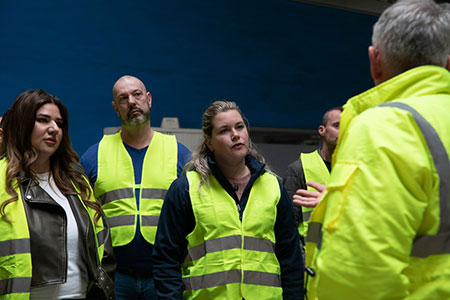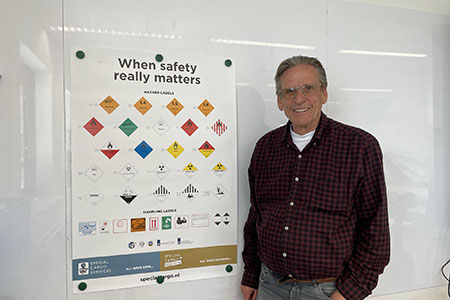On July 1, that’s when all training in the Netherlands for air transport of dangerous goods will be conducted according to a new methodology: IATA’s so-called CBTA. As Holland’s first IATA-accredited training provider, Special Cargo is busy implementing them into its course offerings. On behalf of Special Cargo, co-founder Hans van der Maat has been involved in the development of this methodology. “CBTA training is much more efficient, and both employees and employers benefit from that.”
“The entire aviation industry worldwide is transitioning from a traditional training approach to a new way of training personnel,” said Hans van der Maat, founder of SCS Training and Consultancy (brand name: Special Cargo College) in 2003. Not only for the transportation of dangerous goods; pilots, cabin crew and logistics personnel will also be, or already are, trained in a new way. That new way is called Competency Based Training & Assessment (CBTA), or competency-based training and assessment.
What is IATA CBTA?
Competency-based training, what exactly is it? That is, the training courses focus on competencies associated with particular jobs. Hans explains: “So you are trained more on the tasks and responsibilities that go with your job. And trained less on subjects you will never use in practice.” To explain the CBTA approach to its customers, Special Cargo is organizing a series of knowledge sessions in June (see box below this article).
ICAO and IATA
Driving this massive change is the United Nations’ international aviation organization ICAO. One of the working groups within this is the ICAO Dangerous Goods Panel, which is responsible for the so-called
Technical Instructions
: the international regulations for the transport of dangerous goods by air. Aviation organization IATA follows suit in its IATA Dangerous Goods Regulations (IATA DGR). These are the practical guidelines used by the aviation industry. IATA is also involved in training and certifying personnel in the transportation of dangerous goods by air.
Knowledge partner
In 2019, the ICAO Dangerous Goods Panel – after years of consultation – agreed on the introduction of CBTA effective January 2023. The IATA DGR were also updated accordingly. Hans was involved in these developments from the beginning, as an advisor to the Dutch panel member on the ICAO Dangerous Goods Panel. In that capacity, he attended ICAO meetings. “For example, SCS Training & Consultancy was a knowledge partner of the government for many years. And we still are,” said Hans, who has since retired but remains active in the background.
Role of employer
The thinking at IATA CBTA is that the employer is responsible for training staff according to the rules. This can be done at an accredited training institute. In doing so, the employer must provide interim assessments to see if employees can perform their jobs in practice. Hans continues: “As an employer, you must therefore ensure that the knowledge and skills of your personnel are and remain up-to-date. And from the Dutch government, the Inspectorate for the Environment and Transport (ILT) sees to it – through inspections – that this actually happens.”

Guidance
The CBTA approach is included as a requirement in the 2023-2024 edition of the ICAO Technical Instructions and in the 64th edition of the IATA DGR, which is updated annually and became effective January 1, 2023. Hans: “However, the CBTA regulations are not an integral part of the DGR; there is a separate booklet for them: Dangerous Goods Training Guidance. Which is just fine for users: it is – unlike IATA DGR – free to download.”
Introduction in the Netherlands
Based on this drastic change in the law, Dutch regulations also had to be amended, including the Regulations on Recognition of Training Institutions and Assessments of Transport of Dangerous Goods by Air, continues Hans. “And this regulation includes a transition period of six months. That means CBTA training will officially take effect in the Netherlands on July 1.”
Assessments
Every CBTA training always includes an assessment in the form of an exam and/or practical test. This is not administered in the Netherlands by an independent party, such as the CBR, for example, but is provided by the trainer, as are the courses themselves. In doing so, that trainer must obviously also meet the requirements in the above-mentioned regulation. Therefore, training and assessments must be approved by the ILT. “Because otherwise, of course, it becomes very easy to pass all your students.”
IATA accreditation
“But as far as that goes, you’re in the right place with Special Cargo,” he continues, “as the first training provider in the Netherlands, we were CBTA-accredited last year by IATA. This means that our trainings and assessments are guaranteed to meet IATA’s requirements. To this end, we had a two-day audit by IATA: the entire organization and work processes were put under a magnifying glass. With a positive result. So we can proudly say that we meet the strictest standards.” In addition, students who pass an IATA CBTA course at Special Cargo can receive an IATA certificate. This is valid worldwide and is registered with IATA in Montreal. Non-IATA-accredited trainers cannot issue IATA certificates.
No unnecessary ballast
Hans develops all IATA CBTA courses for Special Cargo. Some can be taken now, but starting June 1, companies can register for all courses. Hans is pleased that the new methodology is finally becoming official: “It is much better to train employees for the functions and tasks they perform. Then unnecessary ‘ballast’ is avoided.” He gives an example. “Before, if you wanted to become IATA-certified for dangerous goods, you also got a full day of classes in training on classifying dangerous goods. While you probably had nothing to do with that in practice. In the IATA CBTA methodology, that is no longer necessary.”

Acknowledgements
For the purpose of the IATA CBTA system, the Dutch government works with a recognition system, with one recognition per role in the logistics process (A through E):
A: for senders
B: for forwarding air cargo agents
C: for ground handlers
D: for logistics service providers
E: for organizations specializing in the transportation of dangerous goods by air
That recognition determines the type of training you must take in the new IATA training methodology. This means that the familiar IATA DGR categories 1 through 12 will be converted to function-based courses IATA 7.1 through 7.10. For example, if you are a consignor of several hazard classes but do not have to classify, you used to do the basic Air Transport Hazardous Materials course (categories 1, 3 and 6). In the new format, you take IATA course 7.1B: Preparing Dangerous Goods for Air Transport.
Less time
Hans continues: “And the great thing is: the total training time will be a lot shorter. Logical, of course, because you only have to learn what you need for your job. Therefore, instead of four days, many courses take only three classroom days. And in the case mentioned above (7.1B), the training takes only two days. And it gets even better: Special Cargo has made an e-learning of the general part (basic knowledge of transporting dangerous goods by air (7.0)). You do this prior to the classroom training, at a time that suits you.”
Safety
All in all, Hans sees only advantages of the new training method: “It is much more efficient, and this benefits not only the employee, but also the employer: he has ‘lost’ his employees for a shorter period of time. But more importantly, it also benefits safety. After all, employees are better equipped to perform their jobs. That’s what we all do it for in the end.”







